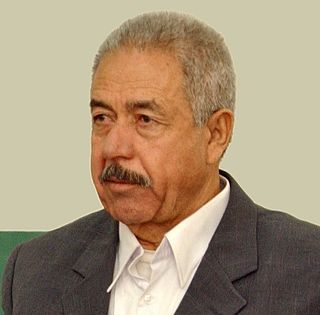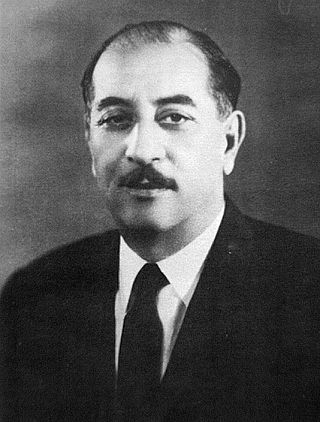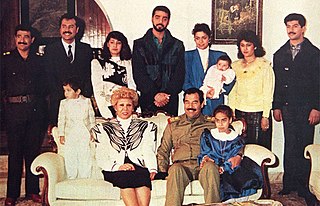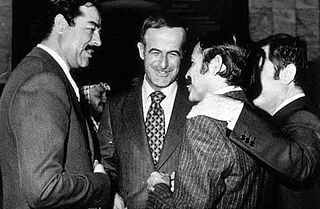| |||||
| Decades: | |||||
|---|---|---|---|---|---|
| See also: | Other events of 1975 List of years in Iraq | ||||
The following lists events that happened during 1975 in Iraq .
| |||||
| Decades: | |||||
|---|---|---|---|---|---|
| See also: | Other events of 1975 List of years in Iraq | ||||
The following lists events that happened during 1975 in Iraq .


Saddam Hussein was an Iraqi politician and revolutionary who served as the fifth president of Iraq from 1979 to 2003. He also served as prime minister of Iraq from 1979 to 1991 and later from 1994 to 2003. He was a leading member of the revolutionary Arab Socialist Ba'ath Party and later its Iraqi regional branch. Ideologically, he espoused Ba'athism, a mix of Arab nationalism and Arab socialism, while the policies and political ideas he championed are collectively known as Saddamism.

Iraq under the Arab Socialist Ba'ath Party saw severe violations of human rights. Secret police, state terrorism, torture, mass murder, genocide, ethnic cleansing, rape, deportations, extrajudicial killings, forced disappearances, assassinations, chemical warfare, and the destruction of the Mesopotamian marshes were some of the methods Saddam Hussein and the country's Ba'athist government used to maintain control. Saddam committed crimes of aggression during the Iran–Iraq War and the Gulf War, which violated the Charter of the United Nations. The total number of deaths and disappearances related to repression during this period is unknown, but is estimated to be at least 250,000 to 290,000 according to Human Rights Watch, with the great majority of those occurring as a result of the Anfal genocide in 1988 and the suppression of the uprisings in Iraq in 1991. Human Rights Watch and Amnesty International issued regular reports of widespread imprisonment and torture.

Ali Hassan Majid al-Tikriti, nicknamed Chemical Ali, was an Iraqi military officer and politician under Saddam Hussein who served as defence minister, interior minister, and chief of the Iraqi Intelligence Service. He was also the governor of Kuwait during much of the 1990–91 Gulf War.

Ahmed Hassan al-Bakr was an Iraqi politician who served as the fourth president of Iraq, from 17 July 1968 to 16 July 1979. He was a leading member of the revolutionary Arab Socialist Ba'ath Party and later the Baghdad-based Ba'ath Party and its regional organisation Ba'ath Party – Iraq Region, which espoused Ba'athism, a mix of Arab nationalism and Arab socialism.

The Revolutionary Command Council was established after the military coup in 1968, and was the ultimate decision-making body in Iraq before the American-led invasion in 2003. It exercised both executive and legislative authority in the country, with the Chairman and Vice Chairman chosen by a two-thirds majority of the council. The Chairman was also then declared the President of Iraq and he was then allowed to select a Vice President. After Saddam Hussein became President of Iraq in 1979 the council was led by deputy chairman Izzat Ibrahim ad-Douri, deputy Prime Minister Tariq Aziz, and Taha Yassin Ramadan, who had known Saddam since the 1960s.
The Iraqi High Tribunal (IHT), formerly the Iraqi Special Tribunal and sometimes referred to as the Supreme Iraqi Criminal Tribunal, is a body established under Iraqi national law to try Iraqi nationals or residents accused of genocide, crimes against humanity, war crimes or other serious crimes committed between 1968 and 2003. It organized the trial of Saddam Hussein and other members of his Ba'ath Party regime.

The trial of Saddam Hussein was the trial of the deposed President of Iraq Saddam Hussein by the Iraqi Interim Government for crimes against humanity during his time in office.

Leyla Qasim was a Feyli Kurdish activist against the Iraqi Ba'ath regime who was executed in Baghdad. She is known as a national martyr among the Kurds.

The 1975 Algiers Agreement, also known as the Algiers Accord and the Algiers Declaration, was signed between Iran and Iraq to settle any outstanding territorial disputes along the Iran–Iraq border. Mediated by Algeria, it served as the basis for additional bilateral treaties signed on 13 June 1975 and 26 December 1975. The territorial disputes in question concerned Iraq's Shatt al-Arab and Iran's Khuzestan Province, and Iraq had wished to negotiate to end Iran's support for the then-ongoing Iraqi Kurdish rebellion after suffering a military defeat in the 1974–1975 Shatt al-Arab conflict. On 17 September 1980, shortly after the Iranian Revolution, the Iraqi government abrogated the treaty in light of another series of cross-border clashes between the two countries. On 22 September 1980, the treaty was completely voided with the Iraqi invasion of Iran, which triggered the eight-year-long Iran–Iraq War.

The 1991 Iraqi uprisings were ethnic and religious uprisings against Saddam Hussein's regime in Iraq that were led by Shia Arabs and Kurds. The uprisings lasted from March to April 1991 after a ceasefire following the end of the Gulf War. The mostly uncoordinated insurgency was fueled by the perception that Iraqi President Saddam Hussein had become vulnerable to regime change. This perception of weakness was largely the result of the outcome of the Iran–Iraq War and the Gulf War, both of which occurred within a single decade and devastated the population and economy of Iraq.
The Directorate of General Security (DGS) also known as Internal State Security is a domestic Iraqi intelligence agency.

Hardan 'Abdul Ghaffar al-Tikriti was a senior Iraqi Air Force commander, Iraqi politician and ambassador who was assassinated on the orders of Saddam Hussein. Additionally he held the titles of vice chairman of the Iraqi Revolutionary Command Council and vice president of Iraq.

House of Saddam is a 2008 British docudrama television miniseries that charted the rise and fall of Saddam Hussein. A co-production between BBC Television and HBO Films, the series was first broadcast on BBC Two in four parts between 30 July and 20 August 2008.

After World War I, Iraq passed from the failing Ottoman Empire to British control. Kingdom of Iraq was established under the British Mandate in 1932. In the 14 July Revolution of 1958, the king was deposed and the Republic of Iraq was declared. In 1963, the Ba'ath Party staged a coup d'état and was in turn toppled by another coup in the same year, but managed to retake power in 1968. Saddam Hussein took power in 1979 and ruled Iraq for the remainder of the century, during the Iran–Iraq War of the 1980s, the Invasion of Kuwait and the Gulf War of 1990 to 1991 and the UN sanction during the 1990s. Saddam was removed from power in the 2003 invasion of Iraq.

Ba'athist Iraq, officially the Iraqi Republic (1968–1992) and later the Republic of Iraq (1992–2003), was the Iraqi state between 1968 and 2003 under the rule of the Arab Socialist Ba'ath Party. This period began with high economic growth, but ended with the country facing severe levels of socio-political isolation and economic stagnation. By the late 1990s, the average annual income had decreased drastically due to a combination of external and internal factors. UNSC sanctions against Iraq, in particular, were widely criticized for negatively impacting the country's quality of life, prompting the establishment of the Oil-for-Food Programme. The Ba'athist period formally came to an end with the 2003 invasion of Iraq, and the Ba'ath Party has since been indefinitely banned across the country.

The 17 July Revolution was a bloodless coup in Iraq in 1968 led by Ahmed Hassan al-Bakr, Abd ar-Razzaq an-Naif, and Abd ar-Rahman al-Dawud that ousted President Abdul Rahman Arif and Prime Minister Tahir Yahya and brought the Iraqi Regional Branch of the Arab Socialist Ba'ath Party to power. Ba'athists involved in the coup as well as the subsequent purge of the moderate faction led by Naif included Hardan al-Tikriti, Salih Mahdi Ammash, and Saddam Hussein, the future President of Iraq. The coup was primarily directed against Yahya, an outspoken Nasserist who exploited the political crisis created by the June 1967 Six-Day War to push Arif's moderate government to nationalize the Western-owned Iraq Petroleum Company (IPC) in order to use Iraq's "oil as a weapon in the battle against Israel." Full nationalization of the IPC did not occur until 1972, under the Ba'athist administration. In the aftermath of the coup, the new Iraqi government consolidated power by denouncing alleged American and Israeli machinations, publicly executing 14 people including 9 Iraqi Jews on fabricated espionage charges amidst a broader purge, and working to expand Iraq's traditionally close relations with the Soviet Union.

The Tulfah family was the family of Saddam Hussein of Ba'athist Iraq who ruled from 1979 to 2003 and established a single party authoritarian government under the control of the Ba'ath Party until the 2003 invasion of Iraq.
The following lists events that happened during 1975 in Iran.

The 1979 Ba'ath Party Purge, also called the Comrades Massacre, was a public purge of the Iraqi Ba'ath Party orchestrated on 22 July 1979 by then-president Saddam Hussein six days after his arrival to the presidency of the Iraqi Republic on 16 July 1979.

Muhyi Abdul-Hussein Mashhadi was an Iraqi Ba'athist politician and leading member of the Arab Socialist Ba'ath Party in Iraq. He was a member of the Regional Command from 1974 to 1979, and the secretary of President Ahmed Hassan al-Bakr.